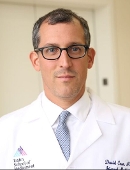Is Red Meat Bad for You?
“Red meat is a source of protein, and it’s recommended to get two to three servings of protein daily for a 2,000 calorie diet. There’re different sources of protein – meat is one of them. You can also get protein from eggs, seafood, nuts, peas, beans. If meat is your main source of protein consumption, I would recommend leaner meat, as opposed to red meat, because red meat, if you look at the data, has been associated with an increased risk of all-cause cardiovascular, as well as cancer related mortality. Whereas lean meat, has a lower mortality with cardiovascular events, as well as cancer associated. So, you can have your occasional steak. But red meat, being your main source of protein, I wouldn’t recommend that.”
Monaa Zafar, MD, is a board certified primary care doctor at Mount Sinai Doctors, seeing patients Monday-Friday. She has a particular interest in disease prevention, health promotion, and chronic illnesses. Dr. Zafar is fluent in Urdu and Spanish. Mount Sinai Doctors is an organization of clinical relationships and multi-specialty services that expand the Mount Sinai Health System’s footprint beyond the seven main hospital campuses into the greater New York City area.


